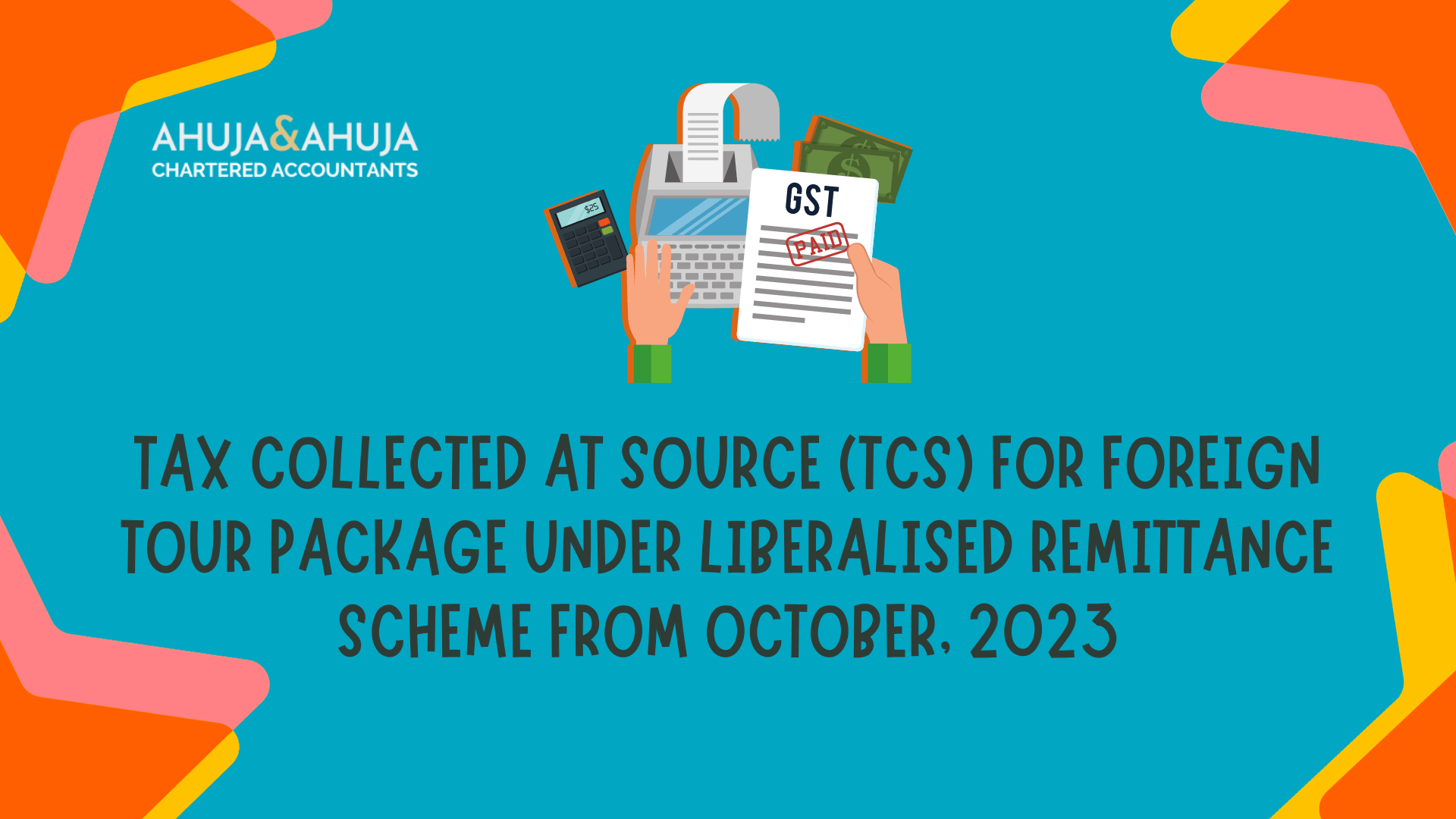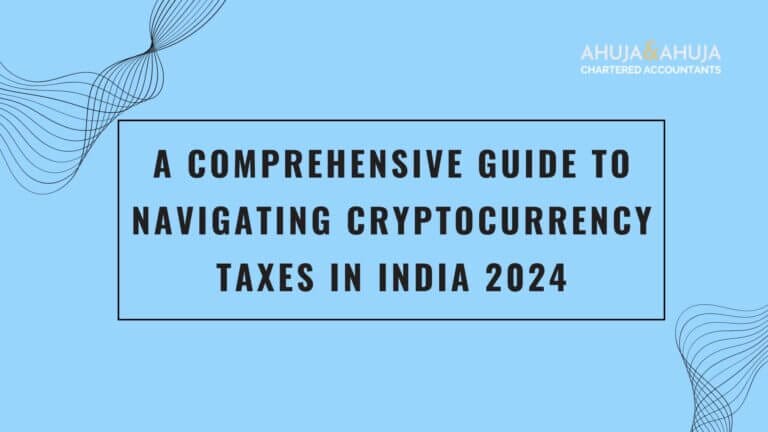Tax Collected at Source (TCS) for Foreign Tour Package under Liberalised Remittance Scheme from October, 2023
In an era where global boundaries seem to blur and international transactions are more common than ever, understanding tax norms becomes crucial. A significant part of these financial transactions is the Tax Collected at Source (TCS), an Indian tax levy applicable to specific transactions conducted within the country as well as cross-border remittances.
Today, we aim to simplify TCS, specifically focusing on the changes introduced for the ‘Foreign Tour Package’ under the Liberalised Remittance Scheme (LRS) from October 2023. Through this guide, we will demystify the complex tax jargon and help you navigate the new mandates with ease.
The first part of our TDS & TCS Return Filings guide delves into what TCS is in the context of the Indian Income-tax Act. But to encapsulate it briefly, as the name suggests, ‘Tax Collected at Source’ refers to the process where a seller collects tax at the point of sale from the buyer and pays it to the Government. It’s a measure to track the generation and exchange of wealth, aimed at bridging the gap in unrecorded transactions.
Next, we will explore the Liberalized Remittance Scheme, crucial to understanding the changes to TCS from October 2023. But before we do, it’s essential to note that this article aims for clarity and understanding of the subject for non-specialists in finance.
Understanding Liberalized Remittance Scheme
The Liberalized Remittance Scheme (LRS) is a framework established by the Reserve Bank of India (RBI) that allows individuals to remit money abroad for various purposes. Under this scheme, individuals can remit up to $2,50,000 per financial year for specific transactions. These transactions include:
- Private visits to any country (except Nepal and Bhutan)
- Gifts or donations
- Going abroad for employment
- Emigration
- Maintenance of close relatives abroad
- Travel for business, attending a conference, specialized training, or meeting medical expenses
- Expenses in connection with medical treatment abroad
- Studies abroad
- Any other current account transaction
It’s important to note that the LRS covers a wide range of transactions and provides individuals with the flexibility to manage their financial needs overseas. For comprehensive guidance on NRI taxation and international taxation matters, you can refer to Ahuja & Ahuja’s NRI Taxation services.
Now that we have understood the basics of the Liberalized Remittance Scheme, let’s dive into Section 206C(1G) of the Income-tax Act, 1961, which pertains to Tax Collected at Source (TCS) on foreign remittances through the LRS and the sale of overseas tour program packages.
Explaining Section 206C(1G) of the Income-tax Act, 1961
Section 206C(1G) of the Income-tax Act, 1961 introduces the concept of Tax Collected at Source (TCS) on foreign remittances through the Liberalised Remittance Scheme (LRS) and the sale of overseas tour program packages. Let’s understand the implications of this section in more detail.
Under this provision, the individual or entity making the foreign remittance through the LRS or selling the overseas tour program package is required to collect tax at the source from the buyer or the person making the payment. The tax collected is then remitted to the government. This ensures that tax is collected at the initial point of transaction itself.
To comprehend the intricacies of international taxation, including the requirement of tax residency certificates, it’s advisable to seek expert advice. For detailed guidance, you can refer to Ahuja & Ahuja’s International Taxation services.
Unfolding the term ‘Overseas Tour Package’
To understand the applicability of Tax Collected at Source (TCS) under the Liberalised Remittance Scheme (LRS), it’s essential to comprehend the concept of an ‘Overseas Tour Package’ as defined under the income tax regulations. Let’s delve into the details.
The term ‘Overseas Tour Package’ encompasses any tour package that offers a visit to a country or countries or territory or territories outside India. It includes expenses related to travel, hotel accommodation, boarding, lodging, or any other expenditure of a similar nature in relation to the tour package. However, it’s crucial to note that the purchase of only an international travel ticket or the purchase of only hotel accommodation does not fall within the definition of an ‘Overseas Tour Package’.
To qualify as an ‘Overseas Tour Package’, the package should include at least two of the following components:
- International travel ticket
- Hotel accommodation (with or without food), boarding, or lodging
- Any other expenditure of a similar nature or in relation thereto
Understanding the components of an ‘Overseas Tour Package’ is crucial in determining whether TCS is applicable or not. If you require assistance with specific tax inquiries such as obtaining a tax residency certificate, you can rely on Ahuja & Ahuja’s Tax Residency Certificate services.
Changes in TCS for Foreign Tour Package
Now that we have gained an understanding of the Liberalised Remittance Scheme (LRS) and the concept of an ‘Overseas Tour Package’, let’s delve into the changes introduced in Tax Collected at Source (TCS) for Foreign Tour Packages from October 2023. These changes have significant implications for individuals and entities involved in such transactions.
Previously, the TCS rates for Foreign Tour Packages were different compared to the rates after October 2023. Let’s examine the previous and revised rates:
- For Foreign Tour Packages under the LRS:
- TCS rate before October 2023: [previous rate]
- TCS rate from October 2023: [revised rate]
It’s important to note that the revised rates for TCS on Foreign Tour Packages differ based on the amount of remittance. For instance, the rate may be 5% for remittances up to a certain amount and 20% for any amount exceeding that threshold. These changes play a significant role in ensuring compliance with tax regulations and the collection of revenue for the government.
As the TCS rates have undergone amendments for Foreign Tour Packages, it’s crucial to stay updated with the latest provisions for smooth financial transactions and adherence to tax regulations.
Specific Case: LRS for Education Financed by Loan
While we have covered the general changes in TCS for Foreign Tour Packages, it’s important to highlight a specific scenario that falls under the Liberalised Remittance Scheme (LRS) – education financed by a loan. Let’s explore the changes in TCS rates for this specific case.
Previously, the TCS rate for education expenses financed by a loan under the LRS was [previous rate] without any threshold. However, from 1st October 2023, the revised TCS rate is 5% for amounts up to 7 Lakhs and 20% thereafter. This change aims to ensure that tax compliance is maintained for educational expenses financed by loans within the LRS.
It’s crucial for individuals planning to finance their education abroad with a loan to be aware of these revised TCS rates and to consult with financial advisors or tax professionals for detailed guidance tailored to their specific circumstances.
Frequently Asked Questions (FAQs)
To provide further clarity on the topic of Tax Collected at Source (TCS) for Foreign Tour Packages under the Liberalised Remittance Scheme (LRS), we have compiled some commonly asked questions and their detailed answers. These FAQs aim to address common queries and doubts that individuals and entities may have regarding this subject.
Are all foreign remittances through the Liberalised Remittance Scheme (LRS) subject to TCS?
No, TCS is applicable only to specific transactions such as foreign remittances through the LRS and the sale of overseas tour program packages. It does not apply to all transactions conducted under the LRS.
What qualifies as an ‘Overseas Tour Package’ for the purpose of TCS under the LRS?
An ‘Overseas Tour Package’ includes any tour package that offers a visit to a country or countries outside India. It should include at least two components such as international travel tickets, hotel accommodation (with or without food), or any other expenditure of a similar nature.
What are the revised TCS rates for Foreign Tour Packages under the LRS from October 2023?
The revised TCS rates for Foreign Tour Packages vary based on the amount of remittance. For amounts up to a specific threshold, the rate may be 5%, and for any amount exceeding that threshold, the rate may be 20%.
Are there any specific changes in TCS rates for education expenses financed by a loan under the LRS?
Yes, from 1st October 2023, the revised TCS rate for education expenses financed by a loan is 5% for amounts up to 7 Lakhs and 20% thereafter.
For personalized advice and guidance on tax compliance, it’s advisable to consult professionals specializing in international taxation. Ahuja & Ahuja provides comprehensive services in this domain.
Conclusion
In this comprehensive guide, we have explored the intricacies of Tax Collected at Source (TCS) for Foreign Tour Packages under the Liberalised Remittance Scheme (LRS). We have covered the basic concepts of TCS, the Liberalised Remittance Scheme, and the definition of an ‘Overseas Tour Package’. Additionally, we have discussed the changes in TCS rates, both for Foreign Tour Packages and the specific case of education expenses financed by a loan.
It is crucial for individuals and entities involved in such transactions to stay updated with the latest provisions and seek expert advice to ensure compliance with tax regulations.
We hope that this guide has provided you with a clear understanding of TCS for Foreign Tour Packages under the LRS. If you have any further queries or require additional assistance, feel free to reach out to the experts in the field.
Remember, navigating the realm of taxes and financial regulations can be complex, but with the right knowledge and guidance, you can ensure smooth transactions and compliance with the law.
Disclaimer
The materials provided herein are solely for educational and informational purposes. No attorney/professional-client relationship is created when you access or use the site or the materials. The information presented on this site does not constitute legal or professional advice and should not be relied upon for such purposes or used as a substitute for professional or legal advice.






